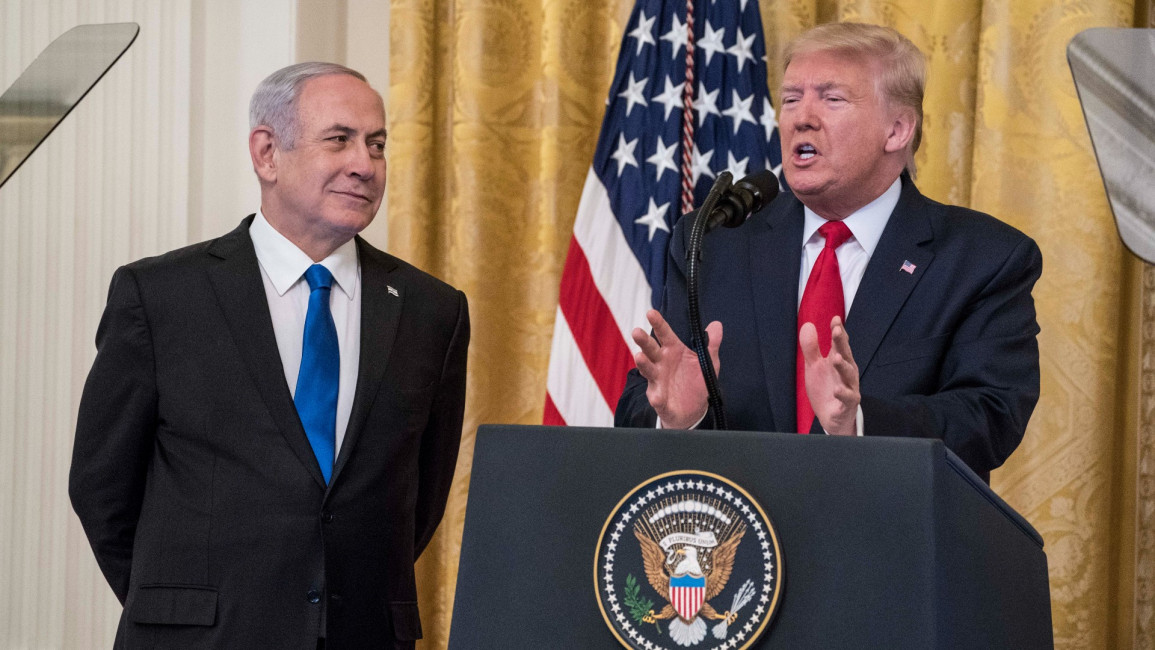Trump adds Israel to CENTCOM military command to increase pressure on Iran
Trump adds Israel to CENTCOM military command to increase pressure on Iran
In one of his final acts as president, Donald Trump has moved Israel from the US European military command to the Central Command (CENTCOM).
2 min read
Trump has moved US military operations in Israel to CENTCOM [Getty]
With less than one week left in his term of office, US President Donald Trump has decided to move Israel from US European Military Command (EUCOM) to US Central Command (CENTCOM) in an effort to shore up support in the Middle East against Iran.
This move follows the normalisation of relations between Israel and several Arab states, including the United Arab Emirates, Bahrain, and Morocco.
Israel will become the 21st nation to be placed under CENTCOM, which oversees US military operations in the Middle East.
CENTCOM also includes all the Arab states of the Gulf and Trump's move is believed to be an effort to put pressure on Iran and influence the foreign policy of the incoming administration of US President-Elect Joe Biden, the Wall Street Journal reported.
The move means US Central Command will be responsible for all American military policy that involves Israel.According to the WSJ, this change was ordered recently but has not been made public until now.
Relations between Iran and the US have become markedly more tense since 2018, when Trump withdrew the US from the JCPOA deal on Iran's nuclear programme, which was signed by the Obama administration.
Iran has recently stepped up its nuclear enrichment level to twenty percent, a number far higher than that specified by the JCPOA deal.
US military leaders praised the decision to move Israel to CENTCOM, saying that it was strategically wise.
"I think moving Israel to CENTCOM makes sense from a US policy perspective in that many Israeli issues are tied to the other countries in CENTCOM’s AOR [area of responsibility]," retired Major General Mike Jones, who served as CENTCOM chief of staff until 2011, told Military Times.
"When I was in uniform I had to have two passports because Arab countries would not let you in if you had an Israeli stamp in your passport," he added.
"Maybe all the Arab states are OK with Israel now with the recognition and movement toward normalisation. Note Saudi Arabia doesn’t appear to be there yet."
This move follows the normalisation of relations between Israel and several Arab states, including the United Arab Emirates, Bahrain, and Morocco.
Israel will become the 21st nation to be placed under CENTCOM, which oversees US military operations in the Middle East.
|
|
CENTCOM also includes all the Arab states of the Gulf and Trump's move is believed to be an effort to put pressure on Iran and influence the foreign policy of the incoming administration of US President-Elect Joe Biden, the Wall Street Journal reported.
The move means US Central Command will be responsible for all American military policy that involves Israel.According to the WSJ, this change was ordered recently but has not been made public until now.
Relations between Iran and the US have become markedly more tense since 2018, when Trump withdrew the US from the JCPOA deal on Iran's nuclear programme, which was signed by the Obama administration.
Iran has recently stepped up its nuclear enrichment level to twenty percent, a number far higher than that specified by the JCPOA deal.
US military leaders praised the decision to move Israel to CENTCOM, saying that it was strategically wise.
"I think moving Israel to CENTCOM makes sense from a US policy perspective in that many Israeli issues are tied to the other countries in CENTCOM’s AOR [area of responsibility]," retired Major General Mike Jones, who served as CENTCOM chief of staff until 2011, told Military Times.
"When I was in uniform I had to have two passports because Arab countries would not let you in if you had an Israeli stamp in your passport," he added.
"Maybe all the Arab states are OK with Israel now with the recognition and movement toward normalisation. Note Saudi Arabia doesn’t appear to be there yet."

![Thousands gather in front of the Cannon House Office Building and the US Capitol to demand the US pressure Israel on a ceasefire in its conflict with Gaza. [Brooke Anderson/The New Arab]](/sites/default/files/styles/image_212x120/public/2023-10/393387495_710301464290105_8375393679399060035_n.jpg?h=ff8c3fa3&itok=HCkMkvW4)

